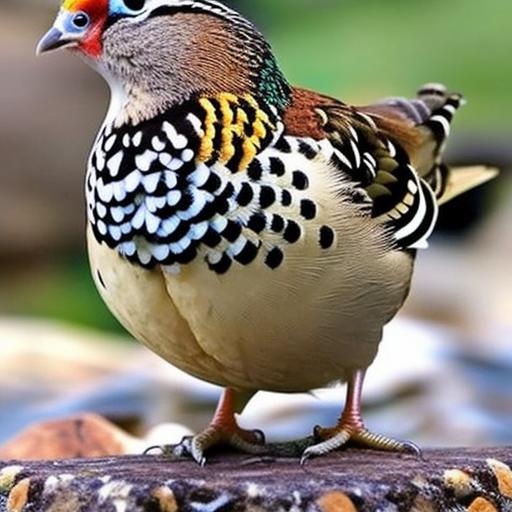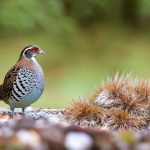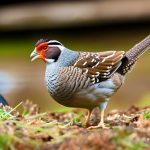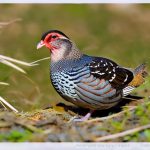Japanese quail, also known as Coturnix quail, are small birds that have gained popularity as pets in recent years. These birds are native to East Asia and have been domesticated for thousands of years. Japanese quail are known for their gentle nature, low maintenance requirements, and the ability to thrive in a variety of environments. They are also prized for their small size, making them suitable for people living in apartments or with limited outdoor space. Japanese quail come in a variety of colors, including brown, white, and speckled, making them visually appealing pets. They are also relatively quiet birds, making them suitable for people living in close quarters with neighbors.
Japanese quail are social animals and are best kept in pairs or small groups. They are known for their gentle and docile nature, making them suitable pets for families with children. These birds are also relatively easy to care for, requiring minimal grooming and attention. Japanese quail are also known for their entertaining behavior, as they are active and curious birds that enjoy exploring their environment. Overall, Japanese quail make excellent pets for people looking for a low-maintenance, gentle, and entertaining animal to add to their household.
Key Takeaways
- Japanese quail make great pets for those with limited space and time, as they are small, low-maintenance birds.
- When housing Japanese quail, it’s important to provide a spacious enclosure with proper ventilation and protection from predators.
- A balanced diet for Japanese quail includes a mix of commercial quail feed, fresh greens, and occasional treats like mealworms.
- Regular health check-ups and access to a qualified avian veterinarian are essential for keeping Japanese quail healthy.
- While Japanese quail are not typically handled like traditional pets, they can still be socialized through gentle interactions and positive reinforcement.
Housing and Enclosure Requirements
When it comes to housing Japanese quail, it’s important to provide them with a safe and comfortable environment that meets their specific needs. A suitable enclosure for Japanese quail should be spacious enough to allow for natural behaviors such as flying short distances and dust bathing. A minimum of 1 square foot of space per bird is recommended, but more space is always better. The enclosure should also have a solid floor to prevent injury to the quail’s delicate feet.
In addition to space, the enclosure should also provide shelter from the elements and protection from predators. This can be achieved with a solid roof and walls made of wire mesh or other sturdy materials. It’s important to regularly clean the enclosure to prevent the buildup of waste and bacteria. Providing a variety of perches, hiding spots, and enrichment activities such as dust baths and foraging opportunities will help keep the quail mentally and physically stimulated. Overall, a well-designed enclosure is essential for the health and well-being of Japanese quail.
Diet and Nutrition for Japanese Quail
Proper nutrition is essential for the health and well-being of Japanese quail. A balanced diet for quail should consist of a high-quality commercial feed specifically formulated for game birds. This feed should contain a mix of grains, seeds, and essential vitamins and minerals to meet the nutritional needs of the quail. In addition to commercial feed, quail should also have access to fresh water at all times. It’s important to provide water in a way that prevents spills and contamination, such as using a waterer with a narrow opening.
In addition to commercial feed, Japanese quail can also benefit from a variety of fresh foods such as leafy greens, fruits, and vegetables. These can be offered as occasional treats to provide variety in their diet. It’s important to avoid feeding quail foods that are high in fat, salt, or sugar, as these can be harmful to their health. Providing access to grit or small stones is also important, as these help the quail grind their food in their gizzards for proper digestion. Overall, a balanced diet that meets the nutritional needs of Japanese quail is essential for their health and well-being.
Health and Veterinary Care for Japanese Quail
Maintaining the health of Japanese quail is essential for their well-being as pets. Regular observation of the quail’s behavior and appearance can help identify any signs of illness or injury. Common signs of illness in quail include lethargy, decreased appetite, abnormal droppings, and changes in vocalization. If any of these signs are observed, it’s important to seek veterinary care from a professional experienced in avian medicine.
In addition to regular observation, providing a clean environment and proper nutrition is essential for preventing illness in quail. Regular cleaning of the enclosure and providing fresh water and balanced nutrition can help prevent common health issues such as respiratory infections and nutritional deficiencies. It’s also important to provide regular opportunities for exercise and mental stimulation to keep the quail physically and mentally healthy. Overall, proactive observation and preventative care are essential for maintaining the health of Japanese quail as pets.
Handling and Socialization of Japanese Quail
Japanese quail are known for their gentle nature and can be easily handled with proper care and socialization. It’s important to approach quail calmly and gently to avoid causing stress or injury. When handling quail, it’s important to support their body with both hands to prevent them from flapping or struggling. It’s also important to avoid sudden movements or loud noises that can startle the quail.
Socializing quail from a young age can help them become more comfortable with human interaction. Spending time near the quail’s enclosure and offering treats can help build trust and familiarity with their human caretakers. It’s important to approach each quail individually, as some may be more receptive to handling than others. With patience and positive reinforcement, many quail can become comfortable with being handled and may even enjoy human interaction. Overall, gentle handling and positive socialization can help Japanese quail become comfortable pets in a household setting.
Breeding and Reproduction of Japanese Quail

Breeding Japanese quail can be a rewarding experience for pet owners interested in expanding their flock or producing eggs for consumption. When breeding quail, it’s important to provide a suitable environment that encourages natural mating behaviors. This includes providing a spacious enclosure with plenty of hiding spots and privacy for the birds to engage in courtship behaviors.
Quail breeding pairs should be introduced at a young age to allow them to form strong bonds before reaching sexual maturity. Once mature, breeding pairs will engage in courtship behaviors such as vocalizations, preening, and chasing. Female quail will lay eggs in secluded areas within the enclosure, so it’s important to provide suitable nesting materials such as straw or shredded paper. Once eggs are laid, they should be collected daily to prevent them from being damaged or eaten by the birds. With proper care and attention, breeding Japanese quail can be a fulfilling experience for pet owners interested in expanding their flock.
Common Misconceptions and Myths about Keeping Japanese Quail as Pets
There are several common misconceptions and myths about keeping Japanese quail as pets that should be addressed. One common misconception is that quail are dirty or smelly animals. In reality, with proper care and maintenance of their enclosure, quail are relatively clean animals that do not produce strong odors.
Another myth is that quail are difficult to care for or require specialized knowledge. While it’s important to understand their specific needs and behaviors, Japanese quail are relatively low-maintenance pets that can thrive in a variety of environments with proper care.
Finally, there is a misconception that quail are not suitable pets for families with children. In fact, Japanese quail are known for their gentle nature and can be suitable pets for families with children when handled with care and supervision.
Overall, addressing these misconceptions can help potential pet owners make informed decisions about adding Japanese quail to their household as pets.
If you’re considering keeping Japanese quail as pets, you may also be interested in learning about their breeding habits. Understanding whether quails sit on their eggs is crucial for successful breeding. Poultry Wizard has a helpful article on this topic that provides valuable insights into the behavior of quails during the incubation process. You can find more information on this subject by visiting Poultry Wizard’s article on quail egg incubation.
FAQs
What are Japanese quail?
Japanese quail, also known as Coturnix quail, are small ground-dwelling birds native to East Asia. They are popular for their small size, colorful plumage, and pleasant song.
Can Japanese quail be kept as pets?
Yes, Japanese quail can be kept as pets. They are relatively easy to care for and can be kept in a backyard or indoor aviary.
What do Japanese quail eat?
Japanese quail are omnivorous and eat a diet of seeds, grains, insects, and small invertebrates. They can also be fed commercial quail feed.
How much space do Japanese quail need?
Japanese quail require a minimum of 1 square foot of space per bird in a cage or aviary. They also need a separate area for nesting and laying eggs.
Do Japanese quail need companions?
Japanese quail are social birds and do best when kept in small groups. It is recommended to keep at least 3-4 quail together to prevent loneliness and stress.
What kind of housing do Japanese quail need?
Japanese quail can be housed in a variety of enclosures, including wire cages, aviaries, or converted rabbit hutches. The housing should provide protection from predators and the elements.
Are Japanese quail noisy?
Japanese quail are relatively quiet birds, especially compared to other poultry species. They make soft, pleasant calls and are suitable for urban or suburban environments.
Do Japanese quail require special care?
Japanese quail require regular access to clean water, a balanced diet, and protection from extreme temperatures. They also need regular cleaning of their housing to prevent disease.
Meet Walter, the feathered-friend fanatic of Florida! Nestled in the sunshine state, Walter struts through life with his feathered companions, clucking his way to happiness. With a coop that’s fancier than a five-star hotel, he’s the Don Juan of the chicken world. When he’s not teaching his hens to do the cha-cha, you’ll find him in a heated debate with his prized rooster, Sir Clucks-a-Lot. Walter’s poultry passion is no yolk; he’s the sunny-side-up guy you never knew you needed in your flock of friends!







